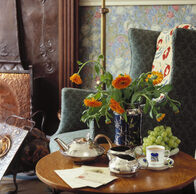
"This type of penetrating gaze, Clare says, is the path to contemplation."
– Ilia Delio, Clare of Assisi: A Heart Full of Love
Our perceptions of women and their role in society has a lot to do with our perceptions of Jesus. Women are working in many careers that they could not have had access to a century ago. They are stepping out into being primary wage earners, and well as community workers, health professionals, mothers, and caretakers. Our society thrives on action and power, and women are no exception. They must compete not to be dominated or underpaid, they must produce at the level of men, and they must lead, in their many paid positions of leadership in every field.
There is little time for any woman in the modern world to sit and contemplate. Yet the great mystics of the Middle Ages were often women. Women emerged as poets in the late 1800's; women worked in factories and did men's labour during the Second World War. Women have emerged in the last 40 years as leaders in the church, and in ministry. What a far cry from a time when women could only serve under the authority of men, or be considered proponents of witchcraft and burned. Women are now known to be able to serve in leadership under Christ, as we are submission to each other.
There is probably no church or denomination in existence today without women in leadership, either by serving or teaching, directing, or in intercession. Yet we are called to make a place of solitude in our lives for contemplation, instead of letting our lives become dull with menial servitude. This is our daily practice: to love Jesus by setting time aside for contemplating him, and the finished work of the cross. Otherwise we may focus on other Christians; otherwise we may compare ourselves. We might envy, we might boast, we might be proud.

"For Clare the use of the mirror as a tool for the spiritual life is not unlike the use of Scripture in the monastic tradition. It helps her to reflect, ponder and consider her life more deeply as a follower and imitator of Christ. Just as in the monastic tradition, in which one prayerfully reads Scripture, slowly ruminating on the Word of God, Clare asks Agnes to "read" the Word made flesh by gazing on the mirror of the cross. Agnes is to "read" with the eye of the heart, penetrating the depth of the image she beholds, as one who is in search of fine pearls." (Ilia Delio).
When we see Christ, we see ourselves, as in a mirror. When we meet children or other very pure people, we may be faced with ourselves as well. Although it is likely for me to think children bring out the best in me, they could make me see the things I do not want to see about myself as well. I could be looking in a mirror. Hardship in life can also bring out the best in us, or bring us face to face with our own weaknesses. Let's press into the faith we have spent our lives in developing. Let it not fail us now.
Aries II
The minutes ticked away,
the author continued her discourse,
and the wind and Rain obeyed.
There was a hush,
without blinking of eyes,
as the child and her mother stared
into the deep midnight
of the divine iris.
There was a hue the size
of a dime, and it grew deeper.
There formed a rainbow:
the colors that the divine iris refracted
were stayed in forty shades,
penetrating and impervious.
They contrasted
the black and white
of former worlds,
of newsprint,
of courtrooms,
of textbooks, examinations,
and concentration camps.
--Emily Isaacson, A Familiar Shore








